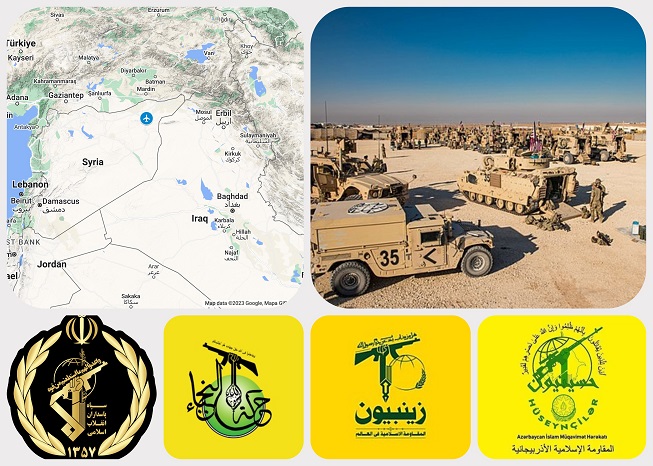Washington Kurdish Institute
By: David L. Phillips March 27, 2023
The drone strike by the Iranian Revolutionary Guard Corps (IRGC) against a US facility in Hasaka last week killed a US contractor and injured six other Americans. The attack was not an isolated incident. Iranian-backed Shiite militias also launched a missile against other facilities including the “Green Village”, a US base close to the border with Iraq. Shiite militias have launched 78 attacks since January 2021. Iran’s goal is to force the withdrawal of 900 US troops remaining in Syria.
The US should resist Iranian efforts to drive it from the region. Washington has a strategic interest in north and east Syria. America’s erstwhile ally, the Syrian Democratic Forces (SDF), is a multiethnic force with Kurds at its core that is critical to preventing a resurgence of the Islamic State. To date, more than 11,000 Kurdish fighters have died and 24,000 wounded fighting ISIS at America’s behest.
The SDF provides another valuable service to the international community. It operates detention centers for captured ISIS fighters numbering 11,000 men, of whom 9,000 are Syrians or Iraqis. Foreign fighters have transited through Turkey, benefitting from funds, training and weapons provided by Turkey’s National Intelligence Agency. Turkey’s cross border attacks against the SDF have destabilized the region. A jail break would be a windfall to the Islamic State. Another 2,000 ISIS detainees from 50 nations would either rejoin the fight in Mesopotamia or go home to commit terrorist attacks. Al Hol camp, with 70,000 ISIS brides and their children, is an incubator of virulent anti-Americanism.
The Biden administration recognizes the threat posed by Iran in Syria. In response to the IRGC’s recent attack, the US launched a retaliatory air strike employing two F-15E fighter jets that hit an ammunition depot and an intelligence collection site in eastern Syria. These pin prick strikes sent a message. But without significant retaliatory action, Iran-backed militias will continue to aggress against US forces and their Kurdish allies. The Pentagon should abandon the principle of proportionality, more intensively interdicting Shiite militias in Syria and ratcheting up the cost of their aggression.
The US is wary of escalation. It must balance its limited response with more pro-active measures to punish Tehran for inspiring militia attacks. The US should not hesitate to launch a preventive strike when an attack against US forces is imminent.
US Central Command needs to investigate how Iranian drones penetrated air defense systems in Hasaka. The Pentagon should determine if the Avenger radar system was working or what other aspects of the layered air defense system failed to stop Iran. Once the weakness has been diagnosed, the Pentagon should upgrade US air defense system to prevent future attacks.
Iran may disavow the actions of Shiite militias. However, these groups are under Iran’s control. Tehran must be held accountable.
Deterrence may include targeted killings, which are permissible in international law when there is no law enforcement option to prevent an imminent terrorist action. Washington has done this before.
General Qasem Soleimani, who spearheaded Iranian military operations in the Middle East as head of Iran’s elite Quds Force, was killed by a US predator drone strike along with other Iran-backed militia figures at the Baghdad Airport in 2020. Under Soleimani’s leadership, Iran expanded its military presence in Iraq and Syria, bolstered Hezbollah, and backed Syria’s offensive against rebel groups in the country’s civil war. The US should not hesitate to launch a targeted killing to dissuade Iran’s hostile action.
The House recently voted on a resolution to withdraw all US forces from Syria within 180 days of passage. The resolution was defeated 321-103. Nonetheless, it garnered more than one hundred votes in favor.
Supporters of the resolution included isolationists and “America firsters” — Lauren Boebert (R-CO), Marjorie Taylor Greene (R-GA), Harriet Hageman(R-WY), Chip Roy (R-TX). Progressive democrats also voted in favor, including Pramila Jayapal (D-WA) Ro Khanna (D-CA), Alexandria Ocasio-Cortez (D-NY), and Rashida Tlaib(D-MI). House members who supported the resolution have nothing in common except naivete and a lack of understanding about the Middle East.
Some legislators may have backed the measure based on their antipathy for Israel. They need to better understand that abandoning Syria would ill-serve both US and Israeli interests. Syria, Iran, and Russia would take it as a green light to intensify military action. Iraqi Kurdistan would also be at risk.
The withdrawal of US forces from Syria would be portrayed as an ignominious defeat by Iranian propagandists. It would cause other countries in the region to recalibrate their calculation of America’s security commitments. After the debacle in Afghanistan, the US would be further discredited by a defeat at the hands of Islamist autocrats.
The Biden administration is wary of conflict escalation with Iran. It must not seek confrontation with Iran. Nor should it turn a blind eye to aggression by Iran and its proxies. Washington must be steely-eyed. Iran is a bad actor, testing US resolve. Killing US forces is a red line that must be enforced. The US must be resolute countering Iran’s aggression.
Mr. Phillips is a former US official who currently works as Director of Program on Peacebuilding and Human Rights at Columbia University.
Disclaimer: The views expressed here represent those of the author and not necessarily those of the WKI.

